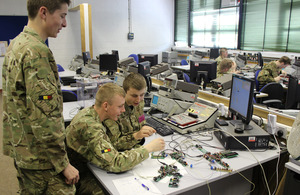Army apprenticeships impress Ofsted
Ofsted has graded the British Army apprenticeship programme as Good, with the hospitality and catering element being graded as Outstanding.

Craftsmen apprentices from the Defence School of Electronic and Mechanical Engineering (stock image) [Picture: Crown copyright]
The overall Good grade, gained following a recent inspection, is a significant improvement on the Satisfactory grade awarded in 2009.
Ofsted - the Office for Standards in Education, Children’s Services and Skills - graded the programme as Good based on the following aspects:
- outcomes for learners
- quality of teaching, learning and assessment
- effectiveness of leadership and management
With an annual value of £27 million, the Army apprenticeship programme is the largest UK employer of apprentices.
Around 95% of soldiers enrol on a trade-related apprenticeship during phase 2 training and continue their programme into the Field Army. At any time, there are more than 15,000 soldiers enrolled on an apprenticeship, with a 90% achievement rate.
The 43 apprenticeship qualifications focus on information and communications technology (ICT) and engineering and logistics, and there is a bespoke apprenticeship for combat infantrymen, along with smaller programmes such as catering and animal care.
Each year, more than 8,000 soldiers gain an intermediate apprenticeship (level 2 is equivalent to 5 GCSEs at grades A to C) or an advanced apprenticeship (level 3 is equivalent to A-level). More than 80% of soldiers will achieve the entry standard for junior non-commissioned officer command leadership management through their apprenticeship.
Read more about Army apprenticeships
Apprenticeship qualifications are trade-related and have 3 elements:
- a technical certificate which builds upon phase 2 trade training (underpinning theoretical understanding)
- a national vocational qualification through assessment of competence in the workplace
- functional skills in maths, English and, in some programmes, ICT